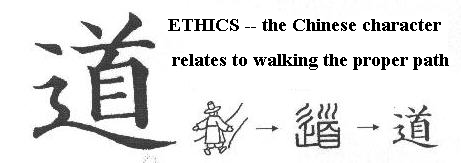|
from The Worldview Literacy Book copyright 2009 back to worldview theme #42 |
| Discussion
The subdivisions of ethics are charted in Figure #42a. Its connection with morality has been discussed elsewhere
(see Discussion, theme #16). Many
use the terms synonymously. While
both connect with right and wrong conduct, ethics is concerned with the
principles, assumptions, and reasoning upon which moral judgments rest.
Like value judgments, moral
judgments bridge the gap between "what is" and "what
ought to be." More
fundamentally they decide what is right and wrong by appealing to some
ultimate authority, standards or principles —which provide the basis
for an associated code of conduct.
Religion has been a major source of morality, providing moral
guides like The Ten Commandments, The Golden Rule (theme #16), The Noble
Eightfold Path, etc. They are byproducts of peoples' search for guidance
through prayer, the right path (Figure #42b), and divine revelation.
Is belief in a moralistic God (theme #14) needed to be a good
person? See Figure #42c.
While the religious & philosophical foundation of morality
& ethics is ancient, in recent centuries it has been enriched by
those working in many fields—including science, medicine, economics,
law, and psychology. While
this topic has a reputation for complexity, and the most inspired
prophets and greatest thinkers have contributed to ethical & moral
wisdom—it can be distilled into a few, common sense rules &
recipes for treating people.
Children hear them ("Don't Lie" "Don't Hurt
People") from parents, ("Do
unto others..." "Thou shalt not...") at Sunday School,
and, according to Robert Fulghum in All I Really Need To Know I
Learned in Kindergarten, when they start school
("Don't take things that aren't yours" "Don't hit people"
"Say you're sorry when you
hurt somebody" "Play fair"
"Share everything"
"Clean up your own
mess"). While much of
this is straight forward, these last three admonitions do lead to
complexities. The first
gets at distributive justice, the second provides a simple way of doing
this—strict egalitarianism—and the third introduces environmental
ethics. (See Discussion, theme #27 "Belonging to Nature" for
more.) |
Discussion—continued Distributive justice is concerned with right or just ways to allocate
the goods, benefits and burdens of economic activity to members of
society. Plans for doing
this vary according to 1) what is to be distributed: wealth, income,
utility, opportunity, welfare, etc; 2) over what group the distribution
to be made; 3) how is the distribution to be made.
Libertarians (theme #50A) feel it should not be made or, like
economic individualists (theme #19), made by the free market. Socialists
(theme #49B) tend to be strict egalitarians.
"Global Citizens" (theme #37B) want to spread whatever
is being distributed to all humans; those who like "Proud
Identification" (theme #37A) would limit it to their nation/nation
state; animal rights activists (theme #44B) and deep ecologists
(theme #27) would broaden it to living things other
than humans. Those valuing
"Education for Democracy" (theme #31) would focus on
distributing educational opportunity, social welfare statists (theme
#49A) on welfare, prioritarians on giving priority to the less well off,
and utilitarians on utility.
The latter group evaluates
the moral rightness of actions by the extent to which they produce
the greatest benefit to all concerned. Those who pursue the "Ethical Orientation" are sympathetic to
that, but tend to be rule utilitarians, rather than act utilitarians.
As such they follow
generally accepted moral rules or principles.
In particular, they use those embodied in the three questions
stated in the worldview theme description above, instead of basing action on (an
often difficult or impossible) quantitative assessment of the utility of
several different possible actions.
Throughout history, the distribution of resources has been viewed
as fixed by nature or God. Hunter-gatherer
societies solved unequal distribution problems by moving; feudal
societies accepted them and looked to God for ultimate justice.
As democracy developed, people increasingly saw government as a
tool for distributive justice. After
the prominent failure of centralized socialist governments (notably in
the Soviet Union, and apparently in China) to idealistically share
economic benefits, many look to reforming capitalism to overcome such
injustice. This is
a goal of those who like "Ethical Globalization" (theme
#51). Technology has brought great economic benefits.
Fairly distributing them, avoiding
related bioethical pitfalls, and "brave new world" nightmares
is a new challenge. |
Figure #42b:
Figure
#42c:
Is Belief In a Moralistic God Needed To Be a Good, Ethical Person? yes—For
some people...as W.T. Stace reports, "I remember ... an ardent
Christian who told me that if he did not believe in a future life, in
heaven and hell, he would rape, murder, steal, and be a drunkard."
(from "Man Against Darkness") no—Many
people, universally respected for contributions to society and their
ethics—including Albert Einstein, John Stuart Mill, Sigmund Freud,
Linus Pauling, Bob Geldof, etc.--have renounced belief in a personal
God. |
|||||||||||||||||
